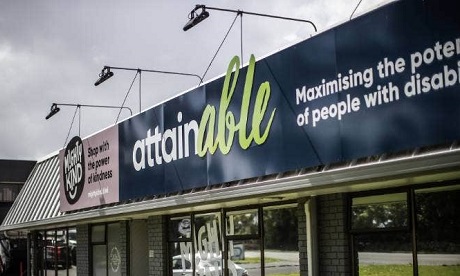Many disabled workers are being paid far less than minimum wage.
Employers offer many reasons for this.
AttainAble – $2.17 an hour
Steve Drury is the general manager at AttainAble. It’s a social enterprise business that runs a factory and community programme.
He says his business model wouldn’t be sustainable if he paid the minimum wage.
Workers with learning disabilities pack, count and label products for contracted customers.
Drury pays them an average of $2.17 an hour.
If he had to pay the minimum wage he “couldn’t offer the contracted customers the jobs at such a low price,” Drury says.
Te Whatu Ora – $7.98 an hour
Woodford Gardens is funded by Te Whatu Ora Waitematā (formerly Waitematā DHB). It’s been running from Waitakere Hospital since 1993.
There, Woodford has a 300-square-metre indoor hydroponics garden.
It’s a place for individuals who struggle to find open employment, the promotional video on Facebook says.
They’re paid an average of $7.98 an hour.
Te Whatu Ora (Health NZ) also funds Wrap ‘N’ Pak, a business in operation since the 1960s.
Like Woodford Gardens, Wrap ‘N’ Pak pays disabled workers an average of $7.98 an hour.
Te Whatu Ora says its enterprises are a stepping stone for “vulnerable service-users who require assistance gaining the skills and confidence that will one day assist them to seek employment elsewhere”.
They declined to elaborate on whether workers were assisted to seek outside employment, or whether Te Whatu Ora had plans in place for paying the minimum wage.
The exemption
The minimum wage is currently $21.20 an hour.
Companies can apply for an exemption under section 8 of the Minimum Wage Act of 1983 for employees whose disabilities “significantly” prevent them from performing at standard capacity.
As part of the exemption, employers must attempt to make reasonable accommodations for the employee.
MBIE says 167 people are currently employed under a minimum wage exemption permit.
A ‘rights-based’ solution
Olivia Kelly, from AUTs law school, says business enterprises or ‘sheltered workshops’ are a “historical hangover”.
She’d like to see disabled people receive appropriate vocational training for employment on the open market.
Subsidies shouldn’t be based on a disabled person’s productivity, she says.
“That’s discriminatory in itself and other employees don’t get subject to that sort of stuff.”
It would be relatively simple for the Government to repeal section 8 of the Minimum Wage Act, and ensure everyone was paid the minimum wage, she says. But society would have to put “an enormous amount of support” to ensure disabled people could get jobs on the open market, she says.
Government response
UN disability experts are concerned about the exemption as a breach of disability rights. They recommend the Government repeal section 8 of the Minimum Wage Act and “ensure that persons with disabilities are paid on the principle of equal pay for work of equal value”.
Minister for Disability Issues Poto Williams says a wage supplement would top up wage rates for disabled employees, so they can be paid the minimum wage.
Source
Additional readingNews category: New Zealand.




